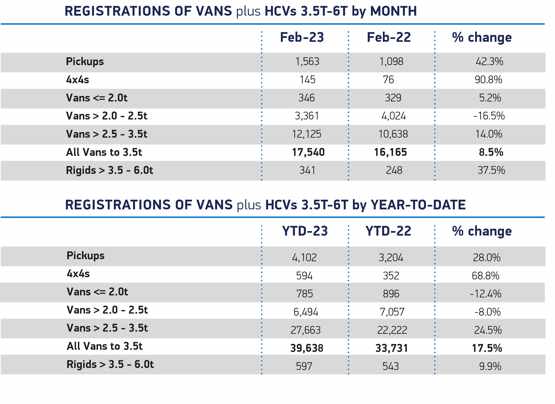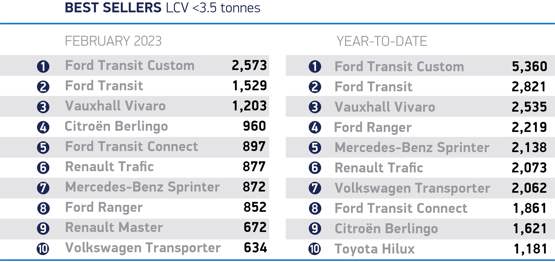Van buyers were seemly unphased by the March plate change as February delivered record registrations for new light commercial vehicles (LCVs).
New van registrations soared by 8.5% during the month, which usually suffers low volumes due to the upcoming plate change in March.
A total of 17,540 new vans were sold in, delivering the best February performance since 1998, according to the latest figures published by the Society of Motor Manufacturers and Traders (SMMT).
Sue Robinson, chief executive of the National Franchised Dealers Association (NFDA), said: “It appears that business customers who order vans are making their decision based on price, value, and practicality to offer the best weight and range capacity available.
“Whilst February’s registration figures are typically restrained due to customers holding off on committing to a new van before March, to benefit from the new ’23 prefix number plate, it is extremely positive to see such strong registration figures.
“Dealers are optimistic with demand for light commercials under 3.5 tonne and, hopefully, with the easing of supply there should be more new vans readily available for customers. With the continued growth in online business, LCV appetite will remain robust.”
 Growth was driven by surging demand for larger vans. Registrations of LCVs weighing 2.5-3.5 tonnes rose by 14.0% to reach 12,125 units, more than two thirds of the total market (69.1%).
Growth was driven by surging demand for larger vans. Registrations of LCVs weighing 2.5-3.5 tonnes rose by 14.0% to reach 12,125 units, more than two thirds of the total market (69.1%).
Medium-sized vans weighing 2.0-2.5 tonnes fell by 16.5% to 3,361 units, reflecting the broader long-term trend towards larger units. The smaller volume pickup and 4×4 utility segments both saw double-digit growth, up 42.3% and 90.8% respectively.
Deliveries of battery electric vans, meanwhile, declined to 966 units, down 44.5% on a particularly strong February in 2022. Limited supplies of zero-emission electric vans is creating “volatility” in the LCV sector, according to BCA.
Mike Hawes, SMMT chief executive, added, “Following a torrid 2022, the UK van market is returning to sustained growth that is exceeding even pre-pandemic levels. Given the importance of vans to keeping the British economy and society on the move, this growth is good news. With the ZEV market still at a very early stage, however, a concerted effort by all stakeholders to accelerate van-suitable chargepoint installation must become an urgent priority, enabling long-term net zero fleet investment at the scale necessary.”
Year to date, overall LCV registrations are up by 17.5% on the same period in 2022 and by 5.3% on the first two months of 2020, pre-pandemic, reflecting demand for these critical vehicles from key sectors.
Van registrations are predicted to grow by 13.9% in 2023 after starting the new year with their first month of growth since the September numberplate change.
SMMT forecasts said that an easing supply chain issues would help propel the light commercial vehicle (LCV) sector’s recovery after January delivered a 25.8% uplift in registrations to 22,098 units.
The Ford Transit Custom remained the UK’s best-selling new van in February, with 2,573 registrations during the month. It’s followed by the larger Transit model, while Vauxhall’s Vivaro continues to outsell its Stellantis stablemates.

